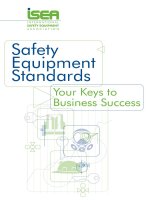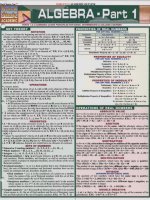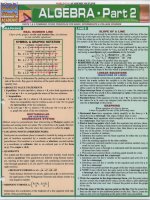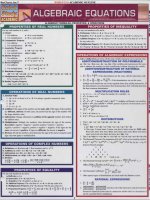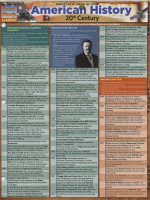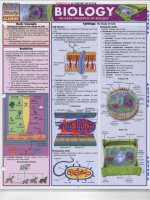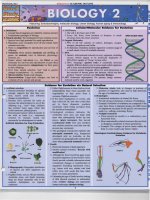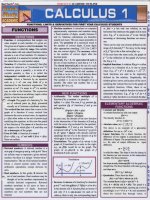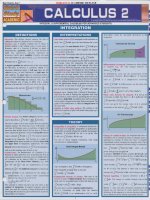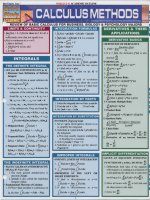Quick study academic keys to college success
Bạn đang xem bản rút gọn của tài liệu. Xem và tải ngay bản đầy đủ của tài liệu tại đây (8.57 MB, 4 trang )
BarCharts, Inc.®
WORLD’S #1 ACADEMIC OUTLINE
click here
In Classroom
Receive
and more!
Taking Notes
BASICS
• Clear, concise notes are more effective than
long, complicated notes
• Instead of using a spiral, use a loose-leaf
notebook divided into class sections
• Make all notes on loose-leaf paper; in an upper
corner, title and date each sheet as it is used
• Rewrite and combine your old study and lecture
notes into a new single set of notes or outline; use
them as a replacement for your old notes in the
loose-leaf binder
LECTURE NOTES
• Sit near the front of the class to avoid distractions
• Be a good listener - focus and concentrate on
the main points of the lecture; get them down on
paper; you’ll put them into your own words later
along with your study notes; pay attention to the
instructors’ clues to what they consider important
• If there is something you don’t understand, ASK!
• For fast classroom access to key information on
major topics, use QuickStudy® products, if
available
• Immediately after a lecture, without looking at
your notes, try to recall on a separate paper as
much as you can about what you have heard
and learned; then, review your actual lecture
notes to confirm and/or supplement your
memory
• During your next study session, quickly recall
again on paper what you learned; then, review
and reorganize your lecture notes in your own
words
• Repeat the recall process several times over
several days to commit the new information to
memory!
Your listening skills, note taking and ability to
manage your sessions will help determine your
success in college!
Dealing with Professors & Tough Classes
• MEET WITH YOUR professors during their posted
office hours
• TALK TO OTHER STUDENTS to find out the real
scoop—which professors to avoid, etc.
• DON'T BE AFRAID TO ASK other students
and professors for copies of old exams; the
questions may change, but the style usually
remains the same
• MAKE SURE YOUR PROFESSOR KNOWS
YOUR NAME: Putting a face with a name
will be a big help, especially if your grade is
borderline
• PROBLEMS WITH FACULTY should be handled
honestly and calmly; always try to remedy
conflicts directly with faculty members first; if the
problem remains unresolved, seek advice from
your academic advisor, a student support
services staff member, or your student handbook
for the next step
What is a
• STUDENT INTERVENTION RESOURCES
- Department Chair
- Dean of the College
- Chancellor or Vice President of Academic
Affairs
- Ombudsman
- Student Government Attorney
• WHAT IRRITATES PROFESSORS AND INSTRUCTORS?
- Sleeping in class
- Not going to class
- Irresponsibility
- Failure to read the syllabus
- Excuses
- Failure to meet deadlines
?
guide
Full-color
25% OFF
Laminated
Handles daily use
or spilled coffee
illustrations & diagrams
Mention CMP000675, expires 9/30/09.
Study Strategies
Time Management
• LEARN TO SAY NO! Balance social time and study time
• DO NOT STUDY FOR MORE THAN TWO HOURS AT A
TIME
• TRY TO STUDY DURING DAYLIGHT HOURS
• USE TWO SCHEDULES
- Using your class schedules as a guide, block out
specific times each day for study and all other
activities
- Create a semester schedule showing midterms,
finals, due dates, and other important events:
Weekly, review both schedules and allow more
study time as needed; a good schedule keeps you
from wandering off course
• PRIORITIZE: List what you need to study each day;
prioritize and set times for each item and stick to it
• USE THE 30-3-2 SCHEDULE
- Study for 30 minutes
- Take a three-minute break; let the break be a time
to think about other things
- Upon returning, take an extra two minutes to
mentally review what you have just read and do a
quick preview of what is coming up next
Study, Study, Study!
STUDY - BREAK - REVIEW - PREVIEW - STUDY
• ATTEND as many academic support activities and
workshops as possible
• STUDY! This may be a case of stating the obvious, but
you would be surprised how many students don't bother
• STUDYING WITH SOOTHING MUSIC in the
background (contrary to popular opinion) can
enhance your concentration
• Studying in a soft chair or on a cushy bed may not be
the best strategy
- Active learning may require walking around the
room or sitting on the edge of the chair
• STUDY SPACE: Your regular study space should be as
quiet and comfortable as possible, and large enough
to have easy access to everything you need for
studying (text and reference books, paper, pencils,
rulers, etc.)
- Libraries, study lounges, or private rooms are ideal
- Get rid of clutter; clear the desk or table of all
materials not related to the current project
• TUTORING IS NOT A BAD THING! Get help early,
before the academic damage is irreversible; many
schools offer free tutoring in a variety of subjects
• Study groups are great, but in general, studying alone
is more effective
Goal Setting
Covers some of the
toughest courses
taught today!
Clear, Concise Information
containing key facts, definitions & formulas
1
• Set realistic goals within a specific time-frame (in writing)
• Goals should be specific and clear
• Determine the purpose of your goals and their
achievement benefits; write them down next to your goal
• Set specific strategies for accomplishing each goal (in
writing)
• Set target dates for self-evaluation
• Periodically visualize your goal, as well as your
strategies for accomplishing the goal
• List potential obstacles to attaining the goal
• List strategies for overcoming obstacles
• Follow through on all strategies
When to use a
!
Click here for 25% OFF
Mention CMP000675, expires 9/30/09.
• Use at the start of a semester as an overview to visualize how all the
elements of the subject fit together
• Use throughout the semester to refresh + reinforce your memory of the topic
• Use during homework time to understand and find answers quickly
•
•
•
•
Use during class to find facts fast
Use to prepare for mid-term and final exams
Use to prepare your own individual outline
Use while traveling; you can take it anywhere
New
products
Flash Cards
Booklets
Anatomy Atlas
Themes & Reports
Reducing Writing Anxiety
• GET A CALENDAR OR ACADEMIC PLANNER
- Follow tips in Time Management on page 1
- First, write down the due date of the paper; next, count
backwards: How many days will you need to write, edit, rewrite, revise, take notes, research, read, select, and narrow
the topic?
- Now you know what day you will need to begin the paper
• BE SURE YOU KNOW EXACTLY WHAT YOUR INSTRUCTOR
EXPECTS
• DON'T BE AFRAID TO EXPRESS A UNIQUE OPINION: The key
is to document and support your ideas in an organized and
cogent manner
• WHEN PROOFREADING TEXT, start at the end of your paper;
read one sentence at a time and work your way to the
beginning; by reading from end to beginning, the pattern is
broken and you will find more errors in grammar, punctuation,
and spelling
• DO NOT RELY ON SPELLCHECK: Remember "principle" and
"principal" are both correct spellings; other biggies—"to" and
"too," "it's" and "its"
• PLAGIARISM MEANS TAKING ANOTHER PERSON'S WORDS
OR IDEAS AS YOUR OWN: Be careful to always cite your
source whether you quote directly or paraphrase; remember,
if it's not common knowledge or your original idea, you must
cite the source
Library Tips
• DO NOT WAIT UNTIL YOUR FIRST RESEARCH
PAPER/PROJECT TO SCOPE OUT THE CAMPUS
LIBRARY
- Many libraries offer tours for freshmen
- Determine the library’s resources, as well as its
limitations, as early as possible
- Learn now to use library computers and card
catalogs to find books by subject or author
- Practice using every machine in the library (i.e.,
microfiche, CD Roms, etc.)
- Use the Reader’s Guide to Periodical Literature
for magazine articles; encyclopedias for general
information on most known topics; almanacs for
facts, lists, charts and tables; atlases for maps,
etc.; ask the librarian for instructions
- If you use the Internet, be sure to cite your
research properly
• KNOW COPIER RULES AND PROCEDURES IN
ADVANCE
- Where are copiers located?
- Does the copier require cash or some sort of
copy card?
• CHECK OUT THE LOCAL COMMUNITY LIBRARIES
They may house the one obscure article or book
you need to earn that "A"
Writing the Paper
• Make/use index cards (put the topic
at the top of each card), notes,
bibliographies, summaries, reports and
reviews as part of your preparation
process to organize your materials
• PREPARE A WRITTEN OUTLINE
- Don’t make the mistake of trying to
keep everything in your head
- Make your outline in the form of
main headings or ideas with subheadings fleshing out the flow of the
paper; this will establish the paper’s
content and conclusion
• WRITE THE PAPER
- Use the outline as a guide and stick
to it
- Write in your own natural style
- Reread, rewrite, revise and edit until
the paper says exactly what you
want to say, the way you want to
say it
- Use correct punctuation and
grammar, and run spellcheck
- Cite all sources, including Internet
searches
Exam Strategies
Preparation
• Learn the exam format: e.g. objective
(true/false or multiple choice) or
subjective (essay)
• Review course outline, notes and
QuickStudy® products
• Review previous tests; check at
departmental office
• Summarize highlights on single sheet
MEMORY DUMP
At the beginning of the test, write down
on a piece of paper everything you
remember—formulas, facts, names,
etc.; scan the test questions; then do a
second memory dump and begin the
test
Objective Exams
• Scan the exam to determine types of
questions
• Always read and follow directions!
• Determine the exam’s scoring rules and
use them to your advantage; if wrong
answers are penalized, don’t guess
unless you can reduce the choices to
two
• Answer easy questions first
• Mark difficult questions and return to
them later
• True/False Questions:
- Pick out key words or those on which
the meaning of a statement hinges
- If any clause in a statement is false,
the statement is false
• Multiple-choice
questions
are
essentially
true/false
questions
arranged in groups
- Usually only one alternative is totally
correct
- Eliminate obvious false choices
- Of the remainder, pick the alternative
that answers most fully all aspects of
the question
2
Essay Exams
• Planning your time when answering essay questions is more
important than in objective type tests!
• Read through the entire examination first
- Get a feel for the questions you are expected to answer
- If the exam allows you to choose from a number of questions, be
sure to number your answers exactly to match the questions
• Follow directions carefully:
- Pay attention to the key words in the question: Words such as
“list,” “describe,” “compare and contrast,” and “outline” require
different types of answers
- Don’t “write around” the question, but answer it directly and
concisely
• Outlining
- After scanning the list of questions, choose those about which
you know most
- On scrap paper, quickly prepare an outline of important ideas
and facts to be included in your response
- Your opening statement summarizes what you are going to write;
the following sentence should support your opening statement
- Your conclusion should show how your body text supported your
opening statement
• It is absolutely essential that your ideas can be read and
understood: Print neatly and use correct grammar, punctuation,
and spelling
Reading Skills
Skimming & Scanning
• WHEN TO USE:
- To determine main idea
- To locate facts quickly
- To answer test items
- To answer chapter questions
• HOW TO SKIM & SCAN:
- Fix intent for reading (or facts sought) clearly in your mind
- Scan table of contents, chapter headings and
subheadings
- Quickly move eyes over reading material, focusing upon
page headings and subheadings, discarding information
that is obviously not related to reading intent
- Skimming should be twice as fast as average reading
speed
- Selectively omit portions of reading material
- Locate as quickly as possible the key or topic sentence of
each paragraph (usually, but not always, the first
sentence)
- Practice skimming and scanning to locate information;
repeated practice will increase speed
- Read the last paragraph carefully for summary
information
- Carefully review tables, charts and side boxes
The SQ3R+Reading Method
• SURVEY
- Preview the assignment/material to be studied by
scanning the text quickly to discover the central concept
- From your preview, formulate an overall picture and the
purpose of what you’re going to study
• QUESTION
- What you need to learn in terms of what, why, how, when,
who and/or where, to support the central concept
- Write these questions in the margins of your textbook or at
the top of your lecture or study notes
• READ
- Read specifically to answer the questions
- Most paragraphs contain one or more main ideas in
support of a concept; locate and highlight them with a
marker; make notes in the margins, summarizing key
points; pay special attention to bolded or italicized type
and to tables, graphs and illustrations which may explain
an idea more thoroughly than text
• RECALL
- Pause periodically (every 15 minutes or so) to recall in
your own words a summary of the important ideas you
have read; write on notepaper as much as you can recall
about what you have read and learned!
- Each mini-review is a knowledge builder and memory
reinforcer
• REVIEW
- Did you answer your questions, understand the new
material and accomplish your goal?
- Reread difficult parts; work a few more problems
Community
Resources
• MAKE YOURSELF AWARE OF COMMUNITY RESOURCES,
ESPECIALLY if you are in a new town; be aware of support
services
- Religious institutions
- Support groups
- Counseling centers
• REALIZE THAT YOU ARE A MEMBER OF THE TOTAL
COMMUNITY
- Do some volunteer work each semester: It's a great way
to build your resume and gain practical experience, plus
it feels good!
Brain Power
Can you remember?
• MEMORIZE FROM GENERAL TO SPECIFIC:
Study the big picture, then learn the details
• CRAMMING DOES NOT WORK! Cramming for
an exam only commits the information to your
short-term memory
• FOUR BASIC REASONS WE FORGET PIECES
OF INFORMATION:
- Don't use the information
- Confuse it with other information
- Decide the information does not match
what you already believe
- Never really learned the information in the
first place
• KEYS TO REMEMBERING:
- Be interested: Pay attention; consciously
choose to remember; establish a need to
remember.
- Visualize: Picture in your mind what you wish
to remember
- Relate: Relate and form associations
between the new ideas and information you
wish to remember and information, ideas,
persons, things, etc., that you already know
- Repeat: Even though something is initially
learned, it will more than likely be forgotten
if not over learned; be sure to repeat
information in your own words
• KEY IDEAS:
- Highlight them in your textbooks and
outlines
- Give extra attention to bolded words or
phrases
- Make up acronyms or mnemonics to recall
(i.e. GIGO = Garbage In; Garbage Out) or
(Please Excuse My Dear Aunt Sally =
Parentheses first, then Exponents, then
Multiplication, Division, Addition and
Subtraction)
• MAPPING
Make a mental image of your notes, outlines,
color-coded QuickStudy® guides, etc. and
where facts are located on them in relation to
other topics; these images (fact maps) and
their data can often be recalled during tests
Critical Thinking Skills
• Learn to evaluate everything you see, read, or
hear; decide for yourself what to believe
• Critical thinking is important in order to:
- Enhance common sense
- Filter emotion
- Categorize experiences
- Select references
- Understand the "experts"
- Sort fact from opinion
- Learn to express yourself in a cogent and
interesting manner
• Critical thinkers are:
- Able to resist manipulation
- Able to overcome confusion
- Able to perceive connections between
subjects and events
- Able to base judgments on evidence and
facts
- Able to realize that the "truth" is never
simple; grey or foggy areas always exist
Money Matters
Financial Aid
• START EARLY AND BE PERSISTENT: The
money will not just come to you
• CONSIDER EVERY POSSIBLE SOURCE of
educational funding and money leads
- Your school's financial aid office
- The Admissions office and recruiters
- Your academic college
- Your church
- Clubs and groups your parents belong to
- Local civic and special interest
organizations
- Professionals already working in your
major field
- Scholarship resource books
- Other students
- Honor societies, sororities, fraternities, etc.
• FILL OUT ALL FORMS COMPLETELY AND
Include
all
required
NEATLY:
documentation
• PAY ATTENTION TO PAYMENT DEADLINES:
Sometimes only a few days can cost you
big dollars
• RESPOND QUICKLY to all requests for
additional information and documentation
• STICK WITH IT! Sometimes the process is
slow and frustrating
• MAKE AN APPOINTMENT TO SEE A
FINANCIAL AID OFFICER AT YOUR
INSTITUTION: Discuss the difference
between grants, scholarships, subsidized
loans, unsubsidized loans, etc.; find out
what type of aid you are eligible for and
what type of aid you can live with later;
remember, all loans must be repaid
• IF YOU ARE AWARDED FINANCIAL AID, be
sure you know the requirements that must
be met in order to keep your award (i.e.
GPA, work status, etc.)
3
Survival Tips
• Realize from the onset that tuition does not
include any other expenses
• SHOP EARLY IN ORDER TO HAVE THE BEST
SELECTION OF USED BOOKS
• You will be bombarded with credit card offers;
be careful: using plastic now may cost you a car
or mortgage later
• GET A CHECKING ACCOUNT and learn how to
keep your account in balance; most banks
have customer service representatives who can
assist you
• SET A REALISTIC BUDGET AND STICK WITH IT:
Remember to include allowances for variable
expenses such as clothing (new purchases and
cleaning), transportation, personal care items,
leisure activities and an emergency fund
Finding a Job
• It's never too early to contact your school's
Career Development Center
• STUDENT EMPLOYMENT OFFICES usually list
more than one thousand part-time jobs for
students; employers who contact the school
know that students will answer their ad; these
employers usually do not squabble about your
class schedule
• ALWAYS GO TO AN INTERVIEW DRESSED
PROFESSIONALLY
• DON'T CHEW GUM AT AN INTERVIEW
• DO NOT BE DISCOURAGED if your first job is not
in your major field
• ALWAYS BE ON TIME FOR APPOINTMENTS: Be
sure to call well in advance if you need to
cancel
• BE SURE TO FOLLOW ALL INSTRUCTIONS (i.e.,
Don't call a potential employer if the ad says fax
a resume)
• ALWAYS PRESENT A RESUME--no matter how brief
How
Tips for Freshmen
I wish someone had told me...
• GO TO CLASS: Class attendance really does
correlate with your grade
• COMMUNICATION IS KEY_especially when
dealing with roommates and professors
• BE ON TIME TO CLASS: Walking in late distracts
both the professor and other students
• DON'T BE AFRAID TO ASK FOR HELP
• COLLEGE IS NOT A CONTEST: You don't have to
compete with anyone for your grade; learn at
your own pace and don't feel inferior if you don't
understand something the first time around
• DON'T BE INTIMIDATED BY FACULTY AND STAFF:
The bureaucracy of higher education is
overwhelming; stay calm, ask questions, and be
sure you know the name of the person you are
talking to
• SUPPORT SYSTEMS ARE ESSENTIAL FOR
SURVIVAL: Make friends; talk to everyone
• EXPECT TO FEEL LONELY, FRIGHTENED, AND
ISOLATED: But also remember_you are not the
•
•
•
•
•
•
only person experiencing these emotions, and it all
gets better with time
READ EVERYTHING! Read your mail!
Don't take policy advice from other students;
check with offices on campus
JOIN IN ALL THE ACTIVITIES YOU CAN
USE YOUR COLLEGE CATALOG: You have to open
it in order to reap the benefits of what is inside
Get a copy of your school's code of ethics (honor
code); a simple mistake could cost your degree
MAINTAIN A POSITIVE ATTITUDE, be a good
listener, stick to your own convictions, and follow
your dreams
makes studying
easier!
“I bought the Spanish guide and I loved
it! It’s complete, yet concise and easy
to use!”
Glen Rice, student
Registration & Advisement
• ACADEMIC ADVISEMENT IS CRITICAL! Visit your
advisor on a regular basis to make sure you are on
track with your academic program, courses, etc.
• PAY ATTENTION TO DEADLINES! If you miss one, it
could cost you– not just money but grades as well
(ex. drop/add, fee payment, course withdrawal)
• Avoid long lines and high frustration levels; use
telephone or computer registration whenever
possible
• Be sure to have university or college
representatives sign every form dealing with
selecting courses, dropping classes, etc.; you may
need it to defend a course selection when you
apply for graduation or to prove you dropped a
class
• SAVE EVERY GRADE REPORT: Computers have
been known to lose grades, courses, credits, etc.
• Periodically ask for an unofficial copy of your
transcript; BE SURE YOUR RECORDS MATCH THE
REGISTRAR’S
• Select classes based on your own academic
capabilities; for example, if science is not your
forte, don't take biology and chemistry in the
same semester
• Be very careful about taking writing classes during
shorter summer semesters; the same holds true for
classes requiring large amounts of reading
• READ THE COURSE CATALOG CAREFULLY
• Typically, freshmen are the last students to register
so PLAN AN ALTERNATE SCHEDULE PRIOR TO
REGISTRATION; your first choice classes may be
filled
“Your guides have changed the way I study.
No more digging through textbooks
looking for formulas and such!”
-Jason Blumenfeld, student
Dorm Do’s & Don’ts
• RESIDENT ASSISTANTS ARE A VALUABLE
RESOURCE; be sure to maintain open
communication with your RA
• YOU MUST LEAVE THE BUILDING when the fire
alarm rings
• CLEAN UP AFTER YOURSELF: Avoid roommate
problems and bug infestation
• MANY SCHOOLS OFFER "SPECIALTY FLOORS";
reserve your room early and be honest about
special requests; some options are:
- Quiet study floors
- Upperclassmen floors
- Health and wellness floors
- Chemically sensitive floors
- Multicultural floors
- Single-sex or co-ed floors
• GET INVOLVED IN RESIDENCE LIFE: Almost every
school sponsors some type of residence hall
government and community activities
• LOCK YOUR DOORS--even when you are in your
room! Better safe than sorry
• PAY ATTENTION TO FEE DEADLINES: Nonpayment of housing fees can result in having to
live in your car
• IF YOUR SCHOOL ALLOWS COOKING IN THE ROOM:
- Check to see which appliances are permitted
for dorm use:
• Dorm size refrigerator
• Microwave
• Toaster Oven
• HOT PLATES ARE RARELY ALLOWED! All
appliances must have enclosed coils
- Never leave your food unattended
- Store leftovers quickly and properly
- Take out the trash every day!
- Remember, some schools do provide
community cooking facilities, but you may need
to clean the area before and after you cook
Staying Healthy
Adjusting to College Life
BEWARE OF FAST FOOD AND CANDY BARS: Most
freshmen gain weight in the first semester
• Gallons of coffee and cola are not the way to
survive finals
- Sleep and study in small shifts
- Exercise often during exam weeks
- Pasta, peanut butter, non-sugar cereals, yogurt,
and fresh fruit will provide natural and sustained
energy
• Check with your school's health services office; it
may offer:
- Free emergency treatment
- Low cost Ob/Gyn exams
- Free condoms
- Low cost dental cleaning and x-rays
- Low cost or free medications
- Free AIDS testing
- Low cost lab work
• APPRECIATE MUSIC--it helps everyone to relax
• THERE ARE FIVE PHASES OF COLLEGE
ADJUSTMENT: As a freshman, you may
experience some or all of the following phases; in
any order, some phases may repeat or overlap:
- Phase 1_Fascination with the new environment
- Phase 2_Severe homesickness
- Phase 3_Finding fault with new surroundings;
building stereotypes
- Phase 4_Finding humor in your adjustment
- Phase 5_Embracing the new culture; it becomes
your “normal” environment
Click here to receive
25% OFF
Mention CMP000675, expires 9/30/09.
*
Computer Based Training
* Select titles
www.barcharts.com
4
